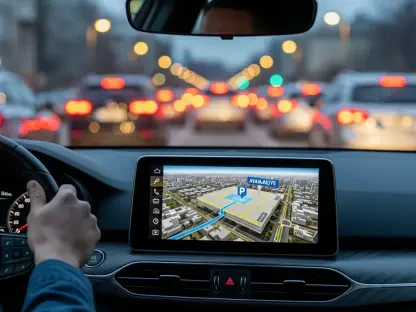In recent years, artificial intelligence has significantly reshaped the landscape of diagnostic imaging in healthcare, promising enhanced precision and efficiency in patient care. As AI technology continues to evolve, it is becoming increasingly integral to medical diagnostics, offering innovative solutions that profoundly impact how healthcare professionals approach disease detection, analysis, and treatment decisions. This transformation is not just changing the way physicians work; it is fundamentally reconfiguring the potential outcomes for patients, offering more personalized and effective care solutions.
AI’s Role in Advancing Medical Imaging
Transformation into Mainstream Healthcare
Previously considered a futuristic dream, artificial intelligence has rapidly transitioned from nascent technology to a staple in modern healthcare. Initially harnessed by top-tier research facilities, AI is now widely incorporated into everyday clinical practices across the globe. This widespread adoption is credited to AI’s remarkable capability to interpret complex imaging data with unparalleled accuracy and speed, enhancing physicians’ ability to diagnose and treat medical conditions swiftly and efficiently.
AI’s proficiency in analyzing various imaging formats, such as X-rays, MRIs, and CT scans, makes it an invaluable asset in diagnosing intricate health issues. AI algorithms are trained to recognize subtle patterns and anomalies that traditional methods might miss, significantly reducing diagnosis time. This proficiency allows physicians to concentrate on critical aspects of patient care, ensuring timely and precise interventions. As AI continues to permeate healthcare, its role in diagnostics exemplifies a broader trend towards holistic, data-driven patient care.
Integration as a Radiologist’s Assistant
AI’s integration into medical imaging is best described as an intelligent assistant rather than a replacement for human expertise. Radiologists, responsible for interpreting voluminous amounts of imaging data daily, benefit from AI’s capability to inspect images at unparalleled speeds, flagging abnormalities and aiding diagnosis. This collaborative approach enhances accuracy and frees radiologists from routine tasks, allowing them to focus on patient-specific decisions.
By automating repetitive tasks, AI expands the radiologist’s capacity to prioritize critical cases and refine diagnostic accuracy. Radiologists can dedicate more time to analyzing complex cases, consulting with colleagues, and optimizing treatment strategies. The introduction of AI has also brought improved efficiency to documentation and reporting processes, standardizing medical practices and enhancing result consistency. This synergy between human expertise and artificial intelligence is transformative, promising a future of improved patient care.
Overcoming Challenges in AI Implementation
Navigating Privacy and Ethical Concerns
Integrating AI into medical imaging is accompanied by significant challenges, particularly regarding privacy, ethics, and accountability. The management of sensitive patient data demands stringent protective measures to safeguard this information against unauthorized access. Ensuring the security and privacy of patient data is essential in maintaining trust and protecting individuals’ rights, requiring ongoing diligence within healthcare systems.
Ethical considerations are equally paramount, requiring transparency in algorithmic processes, accountability for any diagnostic errors, and equitable AI application across diverse populations. To harness AI’s full potential in diagnostic imaging, healthcare providers and policymakers must collaborate to address these challenges, ensuring that ethical standards are met, and patient trust is maintained. Ongoing education and training of medical personnel in the deployment of AI tools are indispensable to avoid misinterpretations and improve digital literacy among healthcare professionals.
Ensuring Effective Collaboration
The successful integration of AI into healthcare demands an effective partnership among technology developers, medical professionals, and healthcare institutions. This collaboration ensures that AI tools adapt to real clinical needs and continually evolve with advancements in medical science. Close cooperation among these stakeholders facilitates the development of AI solutions that are clinically relevant, user-friendly, and responsive to the evolving landscape of healthcare delivery.
By promoting the standardization of procedures and widely disseminating AI applications, even smaller and less specialized healthcare facilities can benefit from advanced diagnostics, bringing equitable healthcare services to a broader population. Successful implementation of AI hinges on continued innovation, ethical stewardship, and inclusive collaboration, ensuring that AI’s transformative potential is fully realized across diverse healthcare settings.
The Future of AI-Driven Precision Care
Merging AI with Personalized Medicine
AI’s role in diagnostic imaging marks a pivotal shift towards integrating tailored medical solutions. The future envisions AI systems synthesizing imaging data with comprehensive patient information, including medical history, laboratory findings, and genetic data. This level of integration will bolster decision-making across medical disciplines, extending beyond radiology to oncology, cardiology, and neurology, offering more nuanced insights for personalized care.
The fusion of AI and personalized medicine holds the promise of refining patient diagnosis and treatment strategies. By concentrating on individual needs and contexts, AI-enabled systems can better predict patient responses, optimize treatment plans, and monitor health outcomes. This holistic approach emphasizes the importance of patient-centered care, where AI serves as a tool to enhance, not replace, the expertise and compassion of healthcare professionals.
Sustaining Human Expertise in Healthcare
In recent years, artificial intelligence has significantly transformed the realm of diagnostic imaging within healthcare. AI’s advancements promise increased precision and efficiency in patient care, marking a pivotal shift in medical diagnostics. As this technology continues to progress, its role becomes ever more crucial, offering innovative solutions that impact how diseases are detected, analyzed, and treated. This transformation is not merely altering physicians’ workflows; it is fundamentally reconfiguring potential patient outcomes by providing more personalized and effective care solutions. Physicians are now able to leverage AI to gain insights from complex data sets, resulting in quicker and more accurate disease detection. Furthermore, AI’s capabilities in predictive analytics assist in crafting tailored treatment plans, thereby enhancing the overall healthcare experience. The integration of AI in diagnostics is a testament to how technology can elevate healthcare standards, ensuring that patients receive the best possible care based on the latest advancements in medical science.









